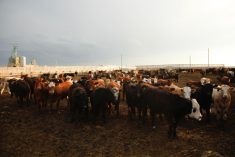Alberta took another punch last week in its fight with porcine epidemic diarrhea (PED), having confirmed the province’s fourth on-farm case of the disease.
Officials with the provincial ag department and Alberta Pork haven’t said where the fourth case is located, nor how far it is from the three southern Alberta properties where outbreaks in hogs were also found so far this year.
Any producers within a 60-km buffer zone surrounding the fourth affected property “will be notified separately and provided additional biosecurity instruction,” Alberta Pork said in a statement Friday.
Read Also

Trump tariff on Brazilian goods could jack up U.S. burger price
U.S. President Donald Trump’s plan for a 50 per cent tariff on goods from Brazil will likely raise prices for the beef that is used in American hamburgers, traders and analysts said on Thursday, as food manufacturers increasingly rely on imports during a time of declining domestic production.
Past that, the ag department said Monday, “all producers in Alberta are advised to increase their biosecurity.”
The province’s three other cases so far were announced in January, February and earlier this month respectively, all on 300- to 600-sow farrow-to-finish operations. In all cases, Alberta Pork said Thursday in a separate release, pig movements were stopped “immediately” following discovery of the disease in hogs.
The first confirmed case was discovered on a farm northeast of Calgary, while the second and third were on farms near Lethbridge, about 30 km apart and about 300 km away from the first case, provincial officials said.
No sources have yet been found for the virus’ arrival in the province and “any possible connection between the outbreaks remains uncertain.”
The first farm has since “emptied its inventory” while the second and third “are in the process of cleaning up and eliminating the disease while animals remain on-farm.”
Alberta Pork on Thursday quoted chief provincial veterinarian Keith Lehman as saying differences exist between Alberta and other known provinces where PED has been found.
Alberta’s hog farms, for example, are farther apart, and assembly yards “routinely test negative for diseases.”
Ontario, which has seen 124 on-farm PED outbreaks since 2014, has had seven since the beginning of 2019; its three most recent cases were confirmed Feb. 20. Manitoba, which has had 108 such cases since 2014, has confirmed two so far in 2019, the most recent on March 7.
PEDv is a coronavirus which leads to severe diarrhea, vomiting and dehydration in affected pigs and can infect up to 100 per cent of a previously unexposed herd, with mortality rates of up to 100 per cent in very young suckling piglets.
A provincially reportable disease in Alberta since Canada’s first outbreaks in 2014, PED is known to be infectious only to swine and is not a food safety or human health risk. — Glacier FarmMedia Network



















